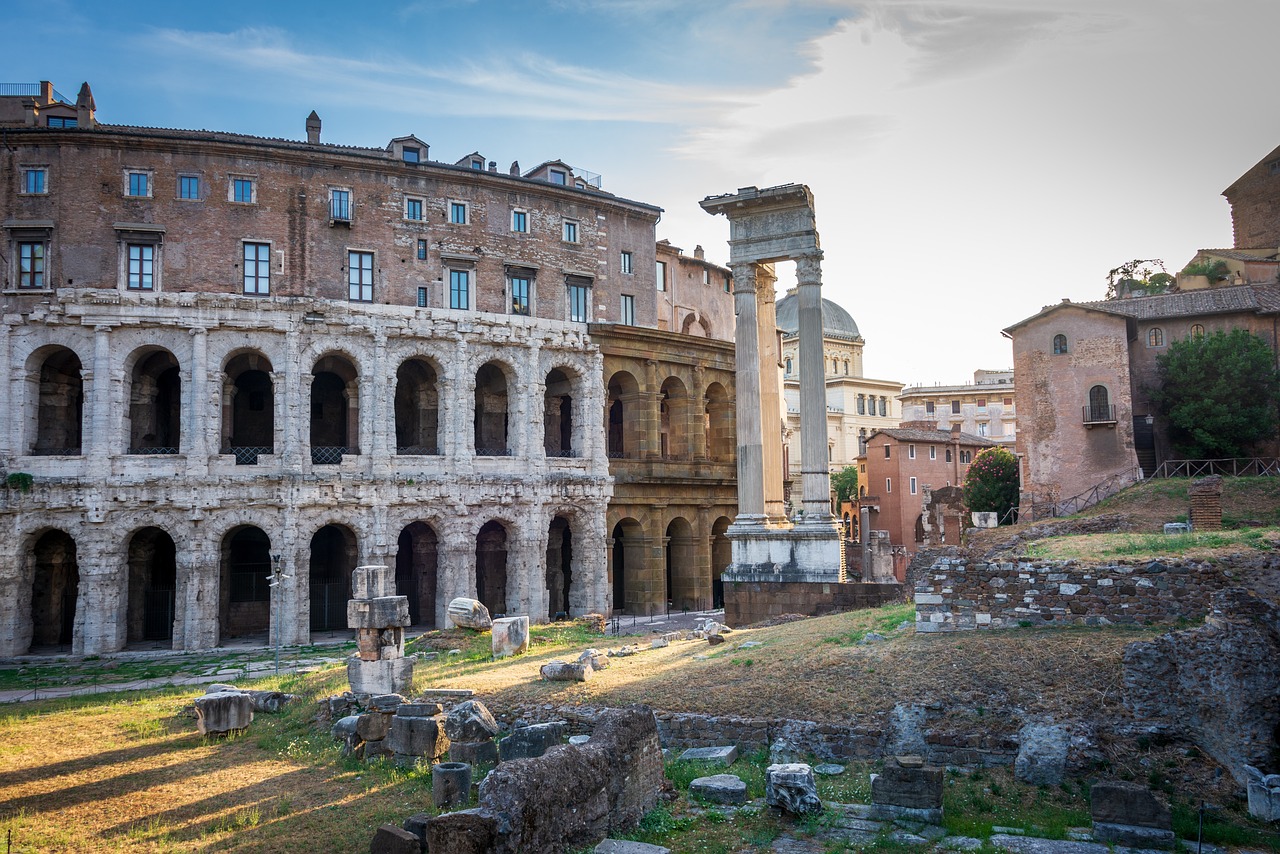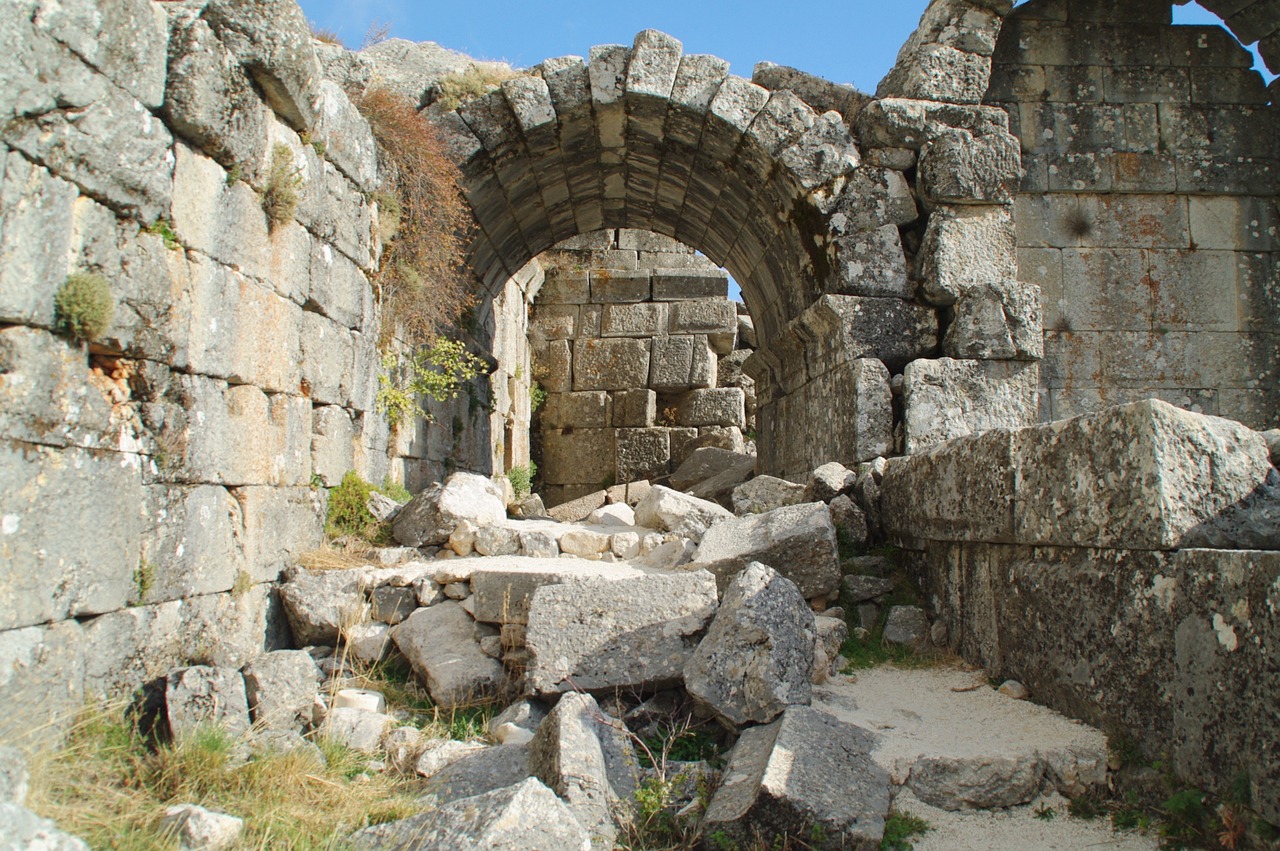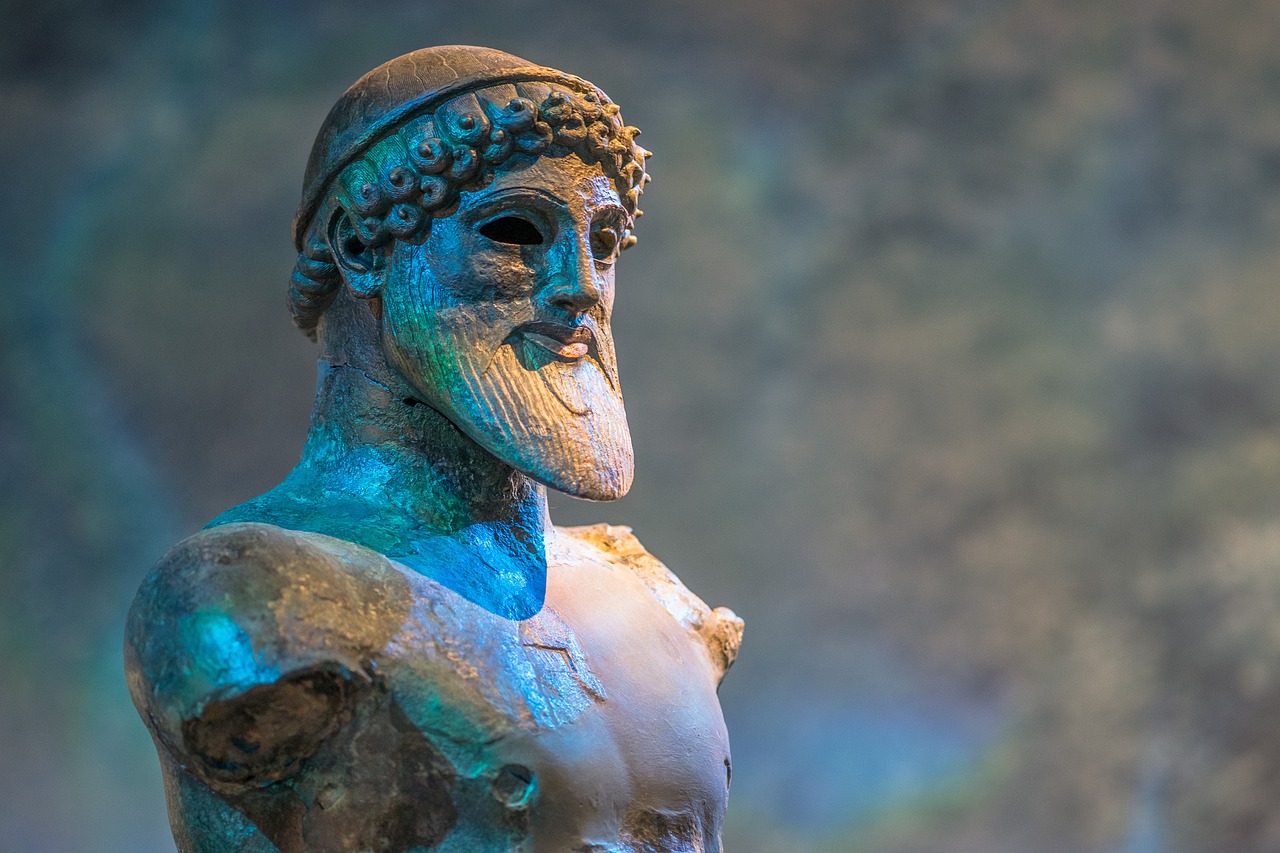The Discovery of the Ancient City of Ephesus
Imagine stumbling upon a hidden treasure trove that holds the secrets of a bygone era, where every stone whispers tales of ancient glory and grandeur. This is precisely the awe-inspiring experience that awaits those who venture into the ancient city of Ephesus, nestled in the heart of modern-day Turkey. The discovery of Ephesus is like uncovering a time capsule that transports you back to a world where trade, culture, and spirituality intertwined to create a vibrant tapestry of civilization.
As you delve into the history of Ephesus, you will unravel the intricate layers of its past, dating back to the 10th century BC when it was founded by the Ionian Greeks. Over the centuries, Ephesus flourished into a bustling Roman metropolis, renowned for its architectural marvels and religious significance. The city's strategic location on the Aegean coast made it a hub of commerce and a melting pot of diverse cultures, attracting pilgrims, traders, and artists from near and far.
The ongoing archaeological excavations at Ephesus have unearthed a treasure trove of well-preserved structures that offer a glimpse into the city's former glory. From the majestic Library of Celsus to the iconic Temple of Artemis, each discovery adds a new chapter to Ephesus's compelling narrative. The Great Theatre, with its capacity to seat thousands, stands as a testament to the city's vibrant cultural life and artistic achievements.
What sets Ephesus apart is not just its historical significance but also its urban layout and architectural splendor. The meticulously planned streets, public squares, and temples reflect the city's prosperity and sophistication, showcasing the ingenuity of its ancient inhabitants. Walking through the ancient ruins, you can almost hear the echoes of bustling markets, philosophical debates, and theatrical performances that once animated the streets of Ephesus.
Life in ancient Ephesus was a tapestry of rituals, traditions, and social hierarchies that shaped the daily existence of its residents. From the worship of deities like Artemis to the thriving commerce and artistic endeavors, every aspect of life in Ephesus was infused with a sense of purpose and meaning. The city's vibrant cultural scene and intellectual pursuits made it a beacon of enlightenment in the ancient world.
However, like all great civilizations, Ephesus faced its own share of challenges that ultimately led to its decline and abandonment. Shifts in trade routes, natural disasters, and the rise of rival cities contributed to Ephesus's gradual decline, leading to its eventual abandonment in the early Middle Ages. Despite its fall from prominence, Ephesus continued to captivate the imagination of explorers and scholars who sought to unravel its mysteries.
In the 19th century, Ephesus was rediscovered by archaeologists eager to unearth its secrets and preserve its legacy for future generations. The ongoing efforts to protect and conserve the ancient ruins of Ephesus have transformed it into a living museum that offers a window into the past. The rediscovery of Ephesus serves as a poignant reminder of the enduring legacy of ancient civilizations and the importance of preserving our shared heritage.
Today, visitors can embark on a journey through time by exploring the archaeological site of Ephesus, where the echoes of the past resonate in every stone. Walking in the footsteps of ancient civilizations, you can immerse yourself in the timeless allure of this historic city, marveling at its well-preserved ruins and reflecting on the enduring legacy of Ephesus.

History of Ephesus
Ephesus, an ancient city located in present-day Turkey, has a history dating back to the 10th century BC. Founded by the Ionian Greeks, Ephesus flourished as a bustling Roman city known for its grand architecture and religious significance. Over the centuries, it evolved into a prominent center of trade and culture, attracting visitors from all corners of the ancient world.
The history of Ephesus is intricately linked with its strategic location and rich cultural heritage. As a key port city on the Aegean coast, Ephesus played a vital role in facilitating trade between the East and the West. Its prosperity was further enhanced by the presence of the Temple of Artemis, one of the Seven Wonders of the Ancient World, which drew pilgrims and merchants alike.
Throughout its history, Ephesus witnessed various periods of prosperity and decline. Under Roman rule, the city reached its zenith, boasting impressive monuments like the Library of Celsus and the Great Theatre. However, with the gradual shift of power and trade routes, Ephesus began to decline, eventually leading to its abandonment in the early Middle Ages.
The archaeological excavations at Ephesus have unearthed a treasure trove of ancient artifacts and structures, shedding light on the city's past glory. From well-preserved temples and theaters to intricate mosaics and statues, each discovery offers a glimpse into the daily life and cultural practices of the city's inhabitants.
Today, Ephesus stands as a testament to its illustrious past, welcoming visitors to explore its ancient ruins and marvel at the architectural wonders that once defined this thriving metropolis. By delving into the history of Ephesus, we not only uncover the mysteries of the past but also gain a deeper appreciation for the enduring legacy of this remarkable city.

Archaeological Excavations
Archaeological excavations at Ephesus have unearthed a treasure trove of ancient wonders, shedding light on the city's illustrious past and significance in antiquity. The ongoing excavations have revealed well-preserved structures that offer a glimpse into the grandeur of Ephesus during its heyday. Among the notable discoveries is the magnificent Library of Celsus, a testament to the city's intellectual and cultural richness. The Temple of Artemis, one of the Seven Wonders of the Ancient World, has also been partially reconstructed, showcasing the religious devotion of the ancient inhabitants. Additionally, the Great Theatre, with its capacity to seat thousands, stands as a reminder of Ephesus's importance as a center for entertainment and civic gatherings.

Importance of Ephesus
Ephesus, with its rich historical and archaeological significance, holds a paramount importance in the ancient world. Serving as a vital hub for trade, religion, and culture, Ephesus attracted visitors from distant lands, drawn by the allure of its renowned Temple of Artemis. The city's strategic location on the Aegean coast facilitated thriving commerce, making it a bustling center of economic activity.
The religious importance of Ephesus cannot be understated, as it was home to the Temple of Artemis, one of the Seven Wonders of the Ancient World. Pilgrims and worshippers flocked to Ephesus to pay homage to the goddess Artemis, seeking her blessings and protection. The city's religious festivals and ceremonies were grand spectacles that showcased the spiritual devotion of its inhabitants.
Furthermore, Ephesus played a crucial role in the dissemination of culture and knowledge throughout the ancient world. Its libraries, theaters, and public spaces were hubs of intellectual exchange, fostering the growth of arts, philosophy, and science. The city's architectural marvels, such as the Library of Celsus and the Great Theatre, stand as testaments to its cultural significance.
Moreover, Ephesus was a melting pot of diverse cultures and civilizations, where ideas and traditions intermingled, creating a vibrant tapestry of societal norms and practices. The city's cosmopolitan atmosphere attracted scholars, merchants, and artisans from far and wide, contributing to its reputation as a center of innovation and creativity.
In essence, the importance of Ephesus transcends its physical boundaries, symbolizing a convergence of history, spirituality, and human achievement. Its legacy continues to captivate modern-day visitors, offering a glimpse into a bygone era of prosperity, piety, and cultural exchange.

Urban Layout and Architecture
When it comes to the urban layout and architecture of the ancient city of Ephesus, one cannot help but be captivated by the sheer grandeur and meticulous planning that characterized this bustling metropolis. Ephesus was not just a city; it was a testament to the ingenuity and vision of its architects and urban planners, who crafted a landscape that seamlessly blended functionality with aesthetic beauty.
The urban layout of Ephesus was a marvel in itself, with a well-defined grid system of streets that intersected at right angles, creating a sense of order and organization that was ahead of its time. The main thoroughfare, known as the Arcadian Way, was a bustling street lined with shops, cafes, and public buildings, bustling with activity and commerce.
One of the most striking features of Ephesus was its public squares, such as the Agora, which served as gathering places for social, political, and commercial activities. These squares were surrounded by impressive buildings, including temples, libraries, and government offices, showcasing the city's wealth and cultural sophistication.
Furthermore, the architecture of Ephesus was a blend of various influences, reflecting the city's diverse history and cultural interactions. From the grand facades of the Library of Celsus to the intricate columns of the Temple of Artemis, each structure in Ephesus was a masterpiece of design and engineering, showcasing the skills and craftsmanship of the ancient builders.
Moreover, the theaters of Ephesus, such as the Great Theatre, were architectural wonders in their own right, with their tiered seating, acoustically designed spaces, and elaborate decorations that spoke to the city's love for entertainment and the arts.
In essence, the urban layout and architecture of Ephesus were not just functional aspects of the city; they were expressions of the creativity, innovation, and cultural richness of the people who inhabited this ancient marvel. Walking through the streets of Ephesus today, one can still feel the echoes of the past, whispering tales of a bygone era filled with architectural splendor and urban sophistication.

Life in Ancient Ephesus
Life in ancient Ephesus was vibrant and diverse, reflecting the city's status as a bustling center of trade and culture in the ancient world. The inhabitants of Ephesus were deeply rooted in religious practices, with the worship of deities like Artemis playing a significant role in their daily lives. The city's social structure was hierarchical, with wealthy merchants and aristocrats enjoying a privileged status, while artisans and laborers contributed to the bustling economy.
One of the central aspects of life in Ephesus was its thriving commerce, facilitated by its strategic location as a major port city. The Agora, or marketplace, was a hub of activity where goods from all corners of the Mediterranean were bought and sold. The city's skilled craftsmen produced exquisite pottery, textiles, and jewelry, which were highly sought after in the region.
Art and culture flourished in ancient Ephesus, with theaters and amphitheaters hosting performances and events that entertained and inspired the populace. The Odeon, a small theater, showcased musical performances and poetry readings, while the Great Theatre, with a seating capacity of over 24,000, hosted grand spectacles and theatrical productions.
Family life was central to the social fabric of Ephesus, with households playing a crucial role in shaping community values and traditions. Women held significant influence within the family unit, managing household affairs and overseeing the upbringing of children. Education was highly valued, with children receiving instruction in subjects like literature, philosophy, and mathematics.
Religious festivals and ceremonies were integral to the spiritual life of Ephesus, with grand processions and rituals honoring the city's patron deities. The Temple of Artemis, one of the Seven Wonders of the Ancient World, stood as a testament to the city's devotion to the goddess, drawing pilgrims and worshippers from near and far.

Decline and Abandonment
As the centuries passed, the once-thriving city of Ephesus began to face challenges that would eventually lead to its decline and abandonment. Various factors played a role in the city's downfall, shaping its fate and transforming it from a bustling metropolis to a deserted archaeological site.
One significant factor contributing to Ephesus' decline was the shift in trade routes and economic patterns. As new trade routes emerged and commercial centers shifted, Ephesus gradually lost its strategic position as a major trading hub. This change in economic dynamics weakened the city's prosperity and influence, ultimately impacting its population and resources.
Natural disasters also took a toll on Ephesus, with earthquakes and floods causing damage to its infrastructure and disrupting daily life. The city's architectural wonders, once symbols of grandeur and sophistication, fell into disrepair as the forces of nature wreaked havoc on the urban landscape.
Furthermore, the political landscape of the region underwent transformations that affected Ephesus' status and significance. As power shifted to other cities and regions, Ephesus lost its political importance and struggled to maintain its former glory. The waning political power of the city contributed to its gradual decline and eventual abandonment.
Despite efforts to preserve and protect Ephesus, the combination of economic, environmental, and political challenges proved insurmountable. The once-vibrant city gradually faded into obscurity, its streets empty, its buildings in ruins, and its former inhabitants long gone, leaving behind a legacy of a bygone era.

Rediscovery and Preservation
Rediscovery and Preservation of Ephesus have been a remarkable journey that sheds light on the ancient city's rich history and cultural heritage. In the 19th century, archaeologists embarked on a mission to uncover the secrets buried beneath the sands of time, leading to the rediscovery of Ephesus and the preservation of its invaluable ruins.
Through meticulous excavations and careful restoration efforts, archaeologists have unearthed a treasure trove of ancient artifacts and structures, providing a glimpse into the past glory of Ephesus. The well-preserved remains of iconic landmarks like the Library of Celsus, the Temple of Artemis, and the Great Theatre offer a window into the city's architectural splendor and religious significance.
Moreover, the ongoing preservation initiatives aim to safeguard Ephesus for future generations, ensuring that this ancient marvel continues to captivate and inspire visitors from around the world. By protecting the archaeological sites and implementing conservation measures, experts strive to maintain the authenticity and integrity of Ephesus, allowing visitors to immerse themselves in its timeless allure.

Visiting Modern Ephesus
Visiting Modern Ephesus is a journey back in time, where the ancient city's grandeur and splendor come to life before your eyes. As you walk through the archaeological site, you will be mesmerized by the well-preserved ruins that whisper tales of a bygone era. The Library of Celsus, with its intricate façade and rich history, stands as a testament to the city's intellectual legacy.
One of the highlights of a visit to Ephesus is the Great Theatre, an imposing structure that once echoed with the voices of thousands. Imagine sitting in the same seats where ancient spectators watched performances and events unfold before them. The Terrace Houses offer a glimpse into the lives of Ephesus' elite, showcasing their luxurious lifestyles and sophisticated tastes.
Strolling down the Marble Street, you can almost hear the bustling sounds of merchants and traders haggling over goods in the Commercial Agora. The Temple of Artemis, one of the Seven Wonders of the Ancient World, may be in ruins today, but its grandeur still captivates visitors with its sheer scale and significance.
For a moment of reflection and tranquility, the Tomb of John the Apostle offers a peaceful sanctuary amidst the ancient city's hustle and bustle. The House of the Virgin Mary, a pilgrimage site for Christians, is a place of spiritual reverence and contemplation.
Frequently Asked Questions
- What is the significance of Ephesus in history?
Ephesus was a crucial city in antiquity, serving as a hub for trade, religion, and culture. It was renowned for its grand architecture, including the Temple of Artemis, and attracted visitors from far and wide.
- What can visitors expect to see at the archaeological site of Ephesus?
Visitors to Ephesus can explore well-preserved structures such as the Library of Celsus, the Temple of Artemis, and the Great Theatre. They can also walk through the intricate network of streets and public squares that reflect the city's prosperity.
- How was Ephesus rediscovered in the 19th century?
Ephesus was rediscovered by archaeologists in the 19th century through excavations that uncovered the ancient ruins. Efforts have since been made to preserve and protect the site for future generations.


















